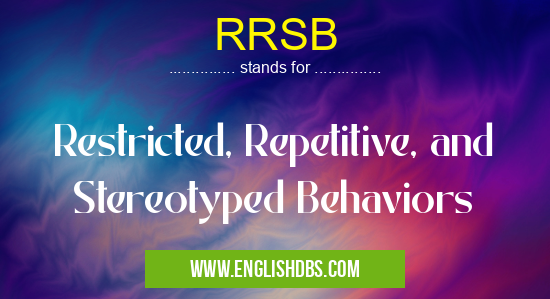What does RRSB mean in MEDICAL
RRSB stands for Restricted, Repetitive, and Stereotyped Behaviors. It is a term used to describe an array of behaviours that are commonly seen in individuals with Autism Spectrum or Developmental Disorders. RRSB is most often used by professionals to assess an individual's functioning in areas such as communication and social interaction, as well as their level of impairment

RRSB meaning in Medical in Medical
RRSB mostly used in an acronym Medical in Category Medical that means Restricted, Repetitive, and Stereotyped Behaviors
Shorthand: RRSB,
Full Form: Restricted, Repetitive, and Stereotyped Behaviors
For more information of "Restricted, Repetitive, and Stereotyped Behaviors", see the section below.
Essential Questions and Answers on Restricted, Repetitive, and Stereotyped Behaviors in "MEDICAL»MEDICAL"
What are restricted, repetitive, and stereotyped behaviours?
Restricted, Repetitive, and Stereotyped Behaviours (RRSBs) are a set of behaviors which may be observed in individuals with Autism Spectrum or Developmental Disorders. They can include stereotypical motor movements such as hand-flapping or rocking back and forth; restricted interests such as an intense focus on one particular activity; repetitive speech patterns; the need for routines; unusual reactions to sensory stimulus such as certain smells or sounds
How do these behaviors manifest?
Restricted, Repetitive and Stereotyped Behaviors often have certain common characteristics across different individuals. These behaviors tend to be repetitive and obsessive; they may be socially inappropriate (such as vocalizing for no apparent reason); they can involve physical self-stimulation such as hand-flapping or rocking back and forth; they may also involve the use of objects in ways that are not typically seen (for example spinning a toy car endlessly). Some individuals may engage in these behaviours in isolation while others may do so in the presence of other people
How do these behaviors affect the individual?
RRSBs can have both positive and negative effects on an individual's functioning. On the one hand, engaging in these behaviours can help an individual cope with anxiety or distress due to their calming effects. On the other hand, these behaviours can limit an individual's ability to interact with other people effectively which can lead to social isolation
Are there interventions available to address these behaviours?
Yes! Treatment approaches such as Applied Behaviour Analysis (ABA) have been found to be effective at reducing RRSBs. Other interventions such as Strength Based Approaches (SBAs), Early Start Denver Model (ESDM), Floortime, Social StoriesTM, Picture Exchange Communication System (PECS), TEACCH Programs etc. may also be beneficial depending upon the severity of symptoms present
Are there any risks associated with RSRBs?
While treatment for RSRBs is often beneficial for improving functioning it is important to note that there are potential risks associated with them too. For example, inappropriate interventions could increase the intensity of certain behaviour patterns rather than reduce it
